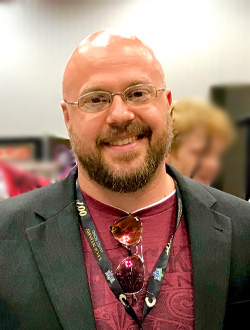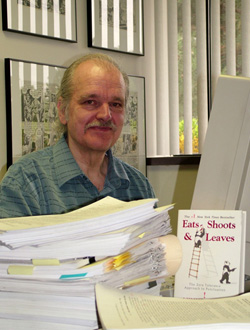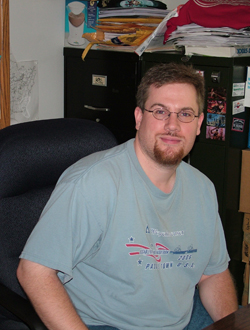Palladium Books Staff
In-House Staff

KEVIN SIEMBIEDA
PUBLISHER, PRESIDENT, LEAD WRITER AND GAME DESIGNER
Born April 2, 1956, Kevin was a Detroit kid who grew up poor, but in a loving home. At an early age, his parents instilled in him a love for books, reading and art. They encouraged his talent for drawing and let his imagination carry him off to lands of wonder. A victim of an overactive imagination, Kevin was always drawing and creating stories or reading books.
At age nine, Kevin announced to his parents that when he grew up, he would be a comic book artist. For the next 14 years, he worked toward that goal with some success.
In 1969, age 12, Kevin met a fellow artist and writer, Alex Marciniszyn. The two quickly became best friends and collaborated in the writing and drawing of countless, unpublished comic books and short stories. In 1970, the duo published two issues of a mimeograph fanzine called Megaton. A year later they published two issues of a photo-offset fanzine titled Nightspawn and one issue of B.S.-P.S. He and Alex were also active in the local comic book fan base and worked with Arvell Jones, who helped mentor Kevin, especially in the area of inking with a brush. Kevin and Alex joined forces again to publish five issues of Detroit’s First Comic Book: A+Plus (1976-1977). A+Plus contributors included such notable local talent as James O’Barr (the Crow), Terry Austin (X-Men), and Tom Orzechowski (Spawn), as well as Kevin and Alex, and a host of others.
In 1974, Kevin started the first of three years of art studies at the prestigious art school known as the Center for Creative Studies (CCS). He entered the fine arts program to learn how to paint in watercolors and oils, and learn new art skills. Elective classes included lettering and fashion design. He worked part-time and in the Summer to pay for classes, but when he failed to win a full scholarship for his fourth and final year, he had to drop out.
Aspiring to become a comic book artist and writer, Kevin did ghost-ink work on Marvel Comics’ Defenders (early 1980s), and inked and colored at Noble Comics (Justice Machine and Cobalt Blue in the mid-1980s). He also did bubblegum rub-on tattoo artwork for Topps and some commercial artwork and logo designs for local companies. His love of the comic book medium is apparent within Palladium’s own products which feature the talents of such notable comic book artists as James Steranko, Richard Corben, Timothy Truman, Flint Henry, Steven R. Bissette, William Messner-Loebs, Michael Gustovich, and Dennis Cowan. Furthermore, Ramon Perezand Freddie Williams II saw some of their very first professional work published by Palladium Books. Both would go on to make careers in the comic book industry.
As a game artist, Kevin did freelance artwork for Judges Guild (1979-1980), FASA (1982), Steve Jackson Games (1982, Cardboard Heroes), the Detroit Gaming Center (1979-1983), Detroit Metro Gamers (1984), and for his own company, Palladium Books.
In 1979, Kevin was lured away from a career in comic books by role-playing games. It was a lucky turn of events that would quickly make him one of the leaders in the role-playing game industry. It was his friend Julius Rosenstein who introduced Kevin to Dungeons and Dragons, not to mention a motley crew of gamers that included Erick Wujcik, Renee Vega and Matthew Balent, all of whom would combine their talents and enthusiasm for gaming to found the Detroit Gaming Center (1979). As Assistant Director of the DGC, Kevin helped establish and run the organization, ran special events, did posters and artwork, painted the sign for the building and hosted a weekly fantasy RPG campaign. The DGC was located in a huge, drafty storefront on Cass Avenue in a shabby part of downtown Detroit, just south of the Wayne State University Campus. It was there, through much experimentation, marathon gaming sessions and play-testing, that the first Palladium rules were fleshed out. Kevin’s epic Defilers™ fantasy campaign ran at the DGC, and The Mechanoid Invasion® was born there.
Kevin’s fantasy game at the Detroit Gaming Center was so popular he had to turn players away. Even so, he had 26 regular weekly players. One expanded game event took over the “big room” and had 32 players and another 30 or so spectators. His players enjoyed his Defiler fantasy campaign so much that one wintery Saturday, all 26 ignored travel advisories and braved travel through a snowstorm that dumped 8-10 inches of snow. Some driving 50 miles to get there!
Kevin’s players urged him to formalize his rules, write the fantasy game and sell it. He did just that, and pitched the idea to every role-playing game company of the day. They all turned him down. Actually, Judges Guild made Kevin an offer that he found much too low to accept. Nonetheless, the owner of Judges Guild liked him and his artwork, and hired him as a freelance illustrator. Kevin pounded out a few hundred illustrations for Judges Guild in a matter of months, and overnight became their top artist. However, pay was lousy and Kevin still had aspirations to do comic books, so he quit to follow his dream.
Meanwhile, his gaming group, not to be thwarted, worked to convince Kevin to publish his fantasy game himself. They pointed to his experience at a local magazine and his past experience at publishing the A+Plus comic book. The idea of publishing his own games appealed to Kevin. He hated the constraints of working for other people and had been bitten by the publishing bug when just a pre-teen. He loved books. It seemed like a great idea. There was one problem: Money. Rather, the lack of it. Kevin and his parents were poor. Working on A+Plus had drained what little money he had saved. Mom and Dad didn’t have a dime to invest. He was a starving artist. It didn’t matter, his players had planted the seed of the idea and it had already taken root. Erick Wujcik and other friends also encouraged the idea.
Young, bold and too stupid to know any better, in 1980, at the age of 24, Kevin set out to start a game company. He named the company “Palladium” after the Defilers campaign known as the Palladium of Desires. After all, it was the inspiration for starting the company. He added the word “Books” because his focus would be publishing game books.
Being poor created its share of challenges and obstacles, so it was not until 1981 that Kevin was able to publish his first game, The Mechanoid Invasion®, on a shoestring budget. But that was not his original plan. Kevin had envisioned the Palladium Fantasy RPG® as his first publication – a big book filled with dynamic artwork. (Art in the early days of RPGs was generally poor to awful, so this would be something noteworthy in and of itself.) The fledgling publisher recognized the value of the (then new) 8½ x 11 soft-cover book format and knew this was the way to publish the Palladium Fantasy RPG®. The cost of printing alone, however, was $10,000 for 5,000 copies. It might as well have been $100,000.
Not one to be easily dissuaded, Kevin devised a plan to start smaller. He knew comic books and knew a 48 page black and white comic book on newsprint would be dirt cheap to print – 60 cents each; $3,000 for 5,000 copies. So he went about creating a new idea for a smaller game: The Mechanoid Invasion® Trilogy. Over the course of the three-part saga, he would introduce the basic rules and some of the key elements of the fantasy game, but not so much as to give it all away.
In 1981, the first book of the trilogy, The Mechanoid Invasion®, was ready for publication, but money remained an obstacle. Kevin had managed to scrape together $1,500 but he needed $3,000. He turned to the mother of his friend, Bill Loebs, and offered her a percentage of the profits on the book for a $1,500 investment, plus he guaranteed her full investment back in two years. To his delight, Mrs. Loebs agreed. Without the trust and kindness of Francis Loebs, Palladium might never have gotten off the ground.
The Trilogy was a modest success and Kevin pumped all profits back into the company. He ran the business by the seat of his pants, learning through trial and error and experimentation. With each success the business grew, but the money to do the Fantasy RPG remained elusive. Kevin’s friend, Erick Wujcik, suggested doing the Palladium Fantasy game in a similar format as The Mechanoids®, but Kevin felt it had to be a big, juicy book on quality paper to have the proper impact, and to validate Palladium as a game book publisher. It took three years and the additional investment of another bold friend, but Kevin finally had the money to produce the Palladium Fantasy Role-Playing Game® the way he had always imagined. It was huge risk. If the game failed, it could have put the company under. More than one distributor cautioned against it, saying, “You have a nice little company going, don’t risk it on a fantasy game. D&D owns the market.” In the final analysis, Kevin decided the risk was worth the taking. His patience and planning paid off: The game was a success and the company was off and running.
The up and coming RPG designer snagged the Teenage Mutant Ninja Turtles® license in 1985. It was the next big gamble that paid off in spades. A year later, the Robotech® license was acquired and proved to be another smart move. So much so, that even competitors began to talk about Kevin’s “uncanny sense of the market.” The Ninja Turtles® and Robotech® role-playing games were smash hits that helped to make Palladium Books an industry leader just five years after Kevin had started the company.
Many other games followed, some small successes, some big. All rewarding and fun. Kevin has lost count of how many role-playing game books he has written, co-authored and published.
Rifts® (1990) is Palladium’s most famous game world, with 95+ Rifts® supplemental books and more on the way. And with any luck, a major motion picture someday, videogames and more.
Kevin Siembieda wears many hats. In addition to being the founder, owner, president and publisher of Palladium Books, he is Palladium’s chief game designer, lead writer, art director, creative mentor and visionary. Of course, all these hats were born of necessity. You see, Kevin and Palladium’s humble beginnings didn’t allow him to hire people to do those jobs until years later. He had to do it all himself. He says this was a good thing, because it taught him every aspect of the business and gave him a deep understanding for each job, and respect for the people who have to do them.
According to Kevin, he has always been driven by an overactive imagination and a need to create worlds and tell stories. Storytelling and publishing are in his blood. He also delights in giving talented young artists and writers a forum to hone their abilities and the chance to be published. For years, Palladium Books has been eager to give “fans” with a dream to write or illustrate a shot at doing just that. Many of the writers and artists for Palladium got their start or early break at Palladium. In fact, one of the main reasons for the creation of The Rifter® sourcebook series was to provide an opportunity for fan writers and artists to submit their work for our consideration to publish. The best of such submissions make their way into the pages of The Rifter®.
Despite the ups and downs of the past 30 years, that petulant 9 year-old with the overactive imagination is still driving adult Kevin Siembieda to create new realms of adventure for role-playing games and beyond. He is as excited about RPGs and world building today as he was when he first started the company, and sees opportunity in new mediums and technology.

SEAN OWEN ROBERSON
BUSINESS PARTNER, CREATIVE DIRECTOR
While studying design and production at the University of Texas in Dallas, he was delighted to begin working with Shane and all the great folks at Pinnacle Entertainment Group on Rifts® for the Savage Worlds game system. While coordinating the product line with Kevin Siembieda, the two developed a solid working relationship.
Sean led the update of Rifts® to the Savage Worlds Adventure Edition and is the primary writer and designer of multiple books in the series. He has created material for other Savage Worlds products, Palladium Books, Torg Eternity, and Warhammer 40,000 Roleplay: Wrath & Glory. In 2021 he joined Palladium Books Inc. as Kevin Siembieda's business partner and the company's Creative Director. He continues to oversee work on the Rifts® for Savage Worlds product line, now from the licensor side.

ALEX MARCINISZYN
SENIOR EDITOR, RESEARCHER AND IDEA GUY
Soft-spoken and keenly intelligent, Alex is quick to help wherever his talents are needed. At Palladium Books he works as editor, idea man, sounding board, and in marketing and research as well as answers the telephones, takes orders, works in customer relations, and is one of Palladium’s online moderators. Alex also dabbles in drawing and writing, and is something of an expert in the area of World War II German aviation. He has read countless books about World War II, German aircraft, UFOs and the unexplained.
Alex Marciniszyn’s friendship and association with Kevin Siembieda dates back to 1969 and eighth grade at the same school. Alex and Kevin published their first fanzine together and created countless comic book scripts and stories that never saw publication. Consequently, it’s no surprise the dynamic duo partnered up in 1977 to publish, write and illustrate A+Plus, Detroit’s First Comic Book. The 64 page, black and white comic anthology series died after five issues, but their friendship and collaborations continue to this day. When Kevin founded Palladium Books in 1981, Alex was quick to lend a hand, and has been with the company ever since. That means he’s contributed in some way to virtually every Palladium publication over the last three decades.
Alex was born in 1955, and grew up in Southwest Detroit. He attended Wayne State University, and was involved in the Detroit techno-music scene in the 1980s, helping Rick Davis start and promote his first 45 record. (Kevin drew one of Rick Davis’s first music posters.) Do these guys have a rich history or what?

WAYNE SMITH
EDITOR, SPECIAL PROJECTS AND EDITOR-IN-CHIEF OF THE RIFTER®
Wayne’s first contact with Palladium Books® was in the Spring of 1997, when he came by the office to trade Star Wars action figures to Kevin Siembieda who was collecting them at the time. Wayne volunteered to help pack and ship new releases at the Palladium warehouse and got paid in trade with Palladium product. He hit it off with Kevin and crew, and was asked to try his hand at proofreading. Next came a try at editing. Before long, Wayne was brought onboard as a freelance editor, and by March 1998, he found himself a full-time employee and Editor-in-Chief of The Rifter®, a position he has held ever since.
Like most staff members at Palladium, Wayne Smith fills more than one role. As the man behind The Rifter® he reads and assesses submissions, and selects, edits, and tweaks the ones that see print. Wayne also does typesetting and final layout of all publications, handles special projects, is the staff computer tech, keeps Rifts continuity in line, helps develop concepts, edits all of Palladium’s new book releases, does a little graphic design and is an all around troubleshooter. Every book produced in the last 25 years has Wayne’s fingerprints on it.
Wayne was born in Michigan, and has a background in computer sciences and theater. He is an avid role-player and video gamer. Wayne is a big Detroit Red Wings hockey fan, plays golf and has a pet turtle named Crash. He is widely feared around the office for his uncanny prowess at both foosball and air hockey.
